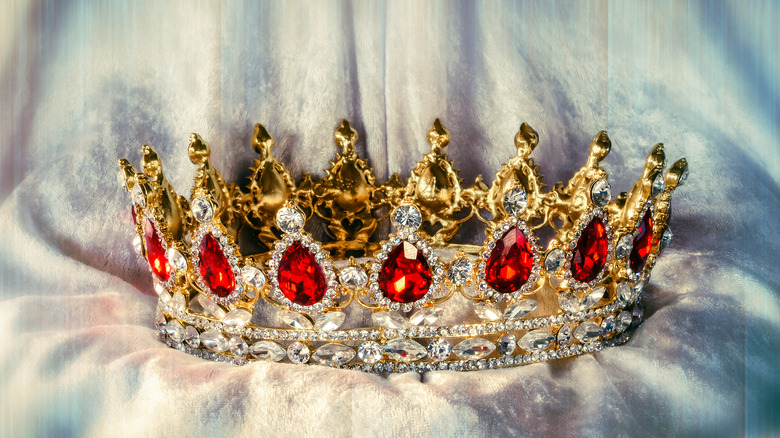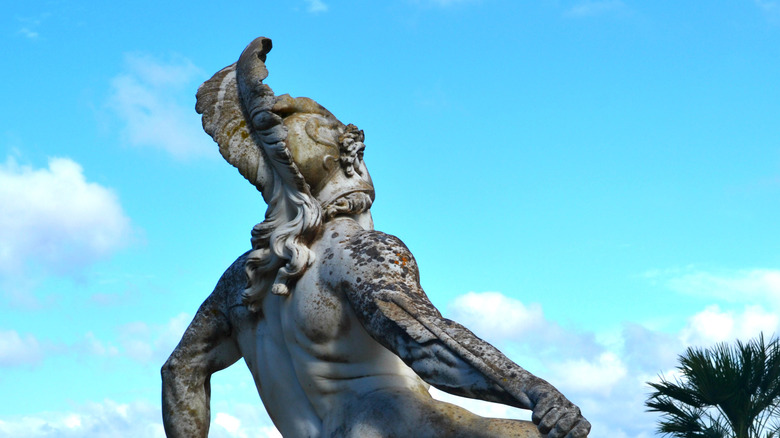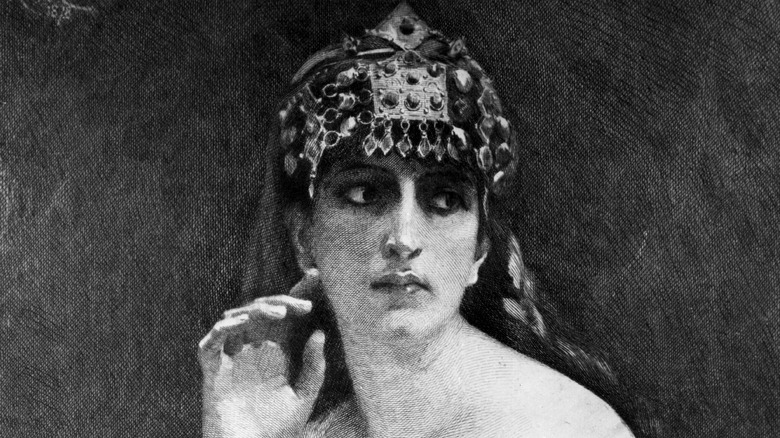Beautiful Baby Names That Have An Ugly History
You can't judge a book by its cover, and you can't judge a name by its history. These baby names are absolutely gorgeous, but they have some pretty ugly stories behind them. "What's in a name?" Shakespeare asked in his tragic play Romeo and Juliet. While the Bard was a literary genius, I'm not so sure I can agree with the idea that names don't matter. If these names were as awful as their histories, they would probably be forgotten today.
Jezebel
The name Jezebel rolls off the tongue. Similar to the more popular "Isabel," it might surprise some that this name isn't more widely used, but there's a reason for it. The character of Jezebel in the Bible was so universally hated that, even today, the name leaves a bad taste in many mouths.
According to the Bible, Jezebel was the wife of King Ahab of Israel. An evil temptress, she brought foreign gods and goddesses to Israel, turned the country to idolatry, and had those who opposed her killed. She was so awful that someone eventually had her thrown out of a window where her body was devoured by wild dogs.
For centuries, Jezebel has represented wicked women. The name was also used to vilify black women prior to the Civil Rights era. Black women in this time "were often portrayed as innately promiscuous, even predatory," and were referred to as "Jezebels."
Lorelai
Fans of Gilmore Girls no doubt were struck by the beauty of the name Lorelei which is carried by two of the titular characters. Despite the show's popularity, the name never really caught on, probably because its dark history overshadowed its loveliness.
According to German legend, a jilted woman threw her herself from the Lorelai rock, which sits along the Rhine River. Transformed into a siren, she remained there, luring fishermen to their deaths.
Achilles
This name is starting to gain some traction, despite its association with the Trojan War. Many are familiar with the tale of the Greek soldier Achilles who was nearly indestructible. To make him invulnerable, his mother dipped him in the River Styx, holding him tightly by the heel. This gave him the power of invulnerability, but left his heel weak. In battle against the Trojans, no one could slay him until an arrow aimed at his heel — his one weakness — killed him.
Cassandra
Cassandra was one of the most tragic figures of the Trojan war. A princess of Troy, she had the power to see into the future, but was cursed so that no one would believe her visions. Even as the battle raged on, no one listened to her warnings of how to avert the coming tragedy. After Troy was defeated, Cassandra was given to one of the victorious Greeks as a concubine, and she was later murdered by his wife.
Tansy
This lovely flower is beautiful on the outside, but has many potent uses. The name is derived from the Greek word athanasía meaning "immortality." It was once thought to actually bestow immortality and was therefore used in embalming practices. The plant has also been used throughout history as an abortifacient to induce miscarriage. Perhaps these uses are why we have not seen the name gain any notable popularity in the past century, particularly when compared to the widespread use of the nearly-identical name Pansy (which had a surge of popularity in the early 1900s).
Lucrezia
A beautiful name with a not-so-beautiful history, Lucrezia (also spelled Lucretia) has become infamous as the name of Renaissance Italian noblewoman Lucrezia Borgia. The power-hungry Borgias are now remembered as one of the most scandalous families in history. While many historians view Lucrezia as a victim of her family's machinations, her reputation has forever been tarnished by the bloodthirsty ambition of the Borgias.
Rumors still abound as to just how large of a role Lucretia played in her family's plots. Some think she was in an incestuous relationship with her brother, Cesare. Others believe that she was involved in the death of her second husband.
Delilah
The name Delilah means "delicate, weak, and languishing" in Hebrew. The name of a character in the Bible, Delilah is a villainess, remembered for seducing the superhumanly strong Samson into revealing the source of his strength. After she learned that Samson's strength is linked to his hair and that if it were cut he would become weak, the wily Delilah had it shorn. Without his strength, Samson was weakened and soon captured by his enemies.
Althea
Althea is one of the lesser-known figures in Greek mythology. A Greek queen, it was prophesied that her son Meleager would die as soon as a piece of wood that was burning in her fire was gone. Desperate to keep her son safe, she had the wood removed from the fire and kept it safe.
Meleager grew to adulthood and killed the Calydonian Boar, which many other hunters had failed to capture. He gave the pelt and tusks to the huntress Atalanta. Jealous of his victory, a fight broke out among the other hunters and Meleager killed his mother's two brothers.
Devastated and angry upon learning that her son had killed his uncles, Althea retrieved the piece of wood and threw it on the fire. Just as had been foretold, as soon as the wood had finished burning, Meleager died.
Lilith
Described as "the most notorious demon in Jewish tradition" by My Jewish Learning, Lilith's name means "the night," and she is often associated with "the emotional and spiritual aspects of darkness: terror, sensuality, and unbridled freedom."
Lilith is considered to be "a spirit of darkness" as well as "a figure of uncontrolled sexuality." Jewish folk tales also portray her "as a stealer of babies," so feared many people use amulets to this day to ward her away from pregnant women and infants.
Griffin
Mythological stories describe the griffin as a terrifying and fierce creature. A staple of ancient Greek literature, griffins are said to have body and hind legs of a lion, with the rest of its body being that of a hawk or an eagle. While the creatures could be vicious, the were also considered to be highly intelligent.
As a given name, Griffin has different origins. It is ultimately derived from a Welsh term meaning "lord" or "prince."
Don't let the history ruin the name
These names might have some horrible histories, but that doesn't mean that you should avoid using them! It's fascinating to see the paths these names have taken, but you don't have to let their legacies taint them for you. Ultimately, a name is what you make of it. If you like the sound of one of these names, go ahead and use it for your precious bundle of joy. Besides, these names are more than beautiful enough to overcome their dark pasts.










